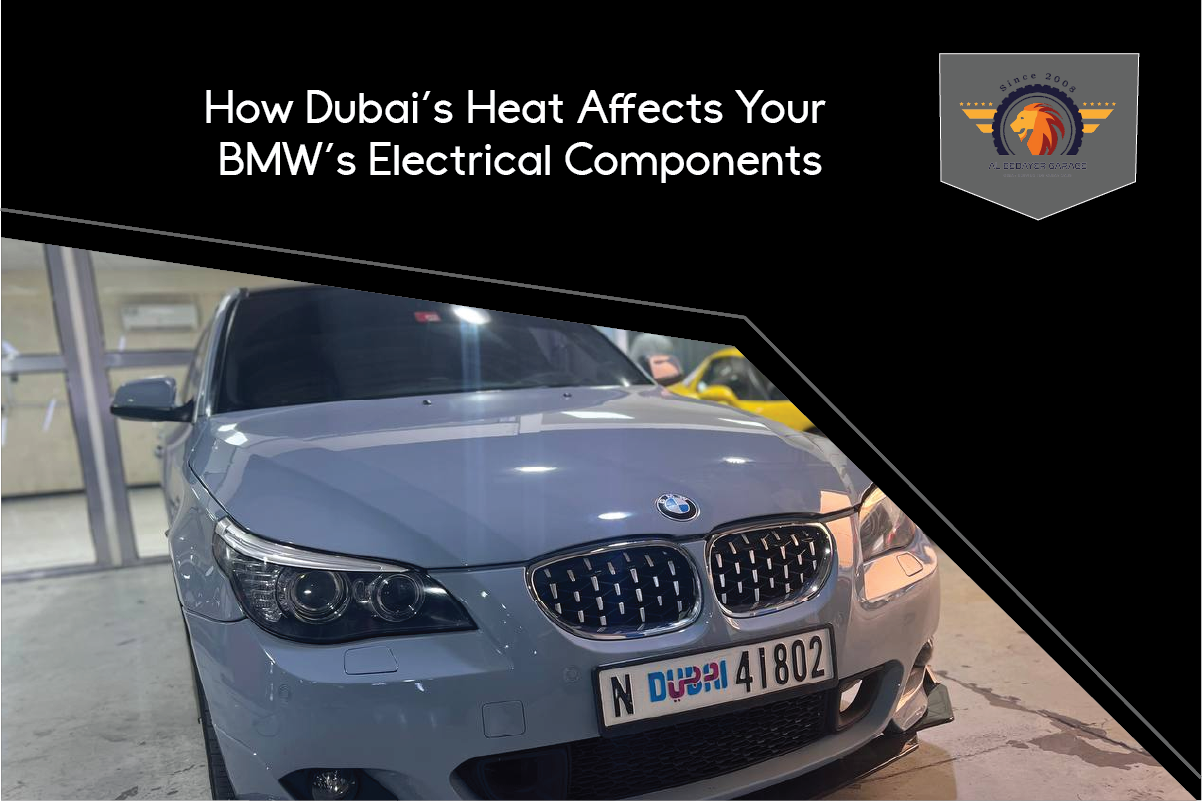Dubai’s scorching heat presents unique challenges for maintaining your BMW’s electrical components. Understanding these impacts and implementing specific preventive measures is crucial to ensure your BMW remains reliable and performs optimally under extreme conditions.
The Impact of Heat on BMW’s Electrical Components in Dubai
Battery Degradation and Failure
Dubai’s intense heat accelerates the chemical reactions within your BMW’s battery, causing faster evaporation of the electrolytes. This leads to a shortened battery lifespan and increased risk of complete battery failure. Additionally, high temperatures can cause the battery case to swell, potentially leading to leaks and further damage.
Strain on the Alternator
The alternator in your BMW works overtime in extreme heat to keep the battery charged and power all electrical components. This additional strain can lead to overheating and premature alternator failure. Signs of alternator issues include dimming headlights, electrical malfunctions, and dashboard warning lights.
Wiring and Insulation Breakdown
High temperatures can cause the insulation around the electrical wiring in your BMW to become brittle and crack. Exposed wires increase the risk of short circuits, electrical fires, and overall system failures. The delicate balance of electrical systems in high-performance cars like BMWs makes this especially concerning.
Electronic Control Units (ECUs) Overheating
ECUs are critical for managing various systems in your BMW, including engine control, transmission, and braking. Excessive heat can cause these units to overheat, leading to malfunctions or complete failure of the affected systems. This can result in reduced performance, increased emissions, and even breakdowns.
Preventive Measures for Protecting Your BMW’s Electrical Components
Regular Battery Maintenance and Upgrades
Check the battery fluid levels regularly, especially during the hotter months. Consider upgrading to a high-performance, heat-resistant battery designed for extreme climates. Additionally, heat shields or insulated covers should be used to protect the battery from direct exposure to heat.
Alternator Health Monitoring
Schedule regular inspections of the alternator, particularly before and after the peak summer months. Look for signs of wear and tear, and replace the alternator if there are any indications of potential failure. An alternator with enhanced cooling features can also help manage the additional heat.
Inspect and Replace Wiring Insulation
Regularly inspect the wiring for any signs of heat damage, such as cracks, brittleness, or discoloration. Replace any damaged insulation immediately to prevent electrical shorts. Using high-temperature resistant wiring can provide additional protection against the heat.
Ensure Proper Ventilation for ECUs
Maintain a clean and well-ventilated environment around your BMW’s ECUs. Make sure the cooling systems are functioning correctly to prevent overheating. In some cases, additional cooling solutions like external fans or heat sinks can be installed to protect the ECUs further.
Use Heat Shields and Thermal Insulators
Installing heat shields and thermal insulators around critical electrical components can significantly reduce the impact of extreme heat. These protective measures help to maintain optimal operating temperatures, thereby extending the lifespan of your BMW’s electrical systems.
Conclusion
Dubai’s extreme heat poses significant risks to your BMW’s electrical components. By understanding these risks and taking targeted preventive measures, you can ensure your BMW remains reliable and performs at its best. Regular maintenance and proactive inspections are crucial to mitigating heat-related issues and protecting your investment.
Frequently Asked Questions
How often should I check my BMW’s battery in Dubai’s heat?
It is recommended to check your battery every three months, especially during the peak summer months, to ensure it is in good condition and the fluid levels are adequate.
What are the signs of alternator failure in a BMW?
Common signs include dimming headlights, unusual noises, electrical malfunctions, and a warning light on the dashboard. If you notice any of these symptoms, have your alternator inspected immediately.
Can Dubai’s heat affect the performance of my BMW’s electronic control units?
Yes, excessive heat can cause ECUs to overheat, leading to malfunctions or failures. Ensuring proper ventilation and using additional cooling solutions can help mitigate this risk.
How can I protect my BMW’s wiring from heat damage?
Regularly inspect the wiring for signs of heat damage and replace any damaged insulation. Using high-temperature resistant wiring and routing wires away from heat sources can also help protect the wiring.
Is it necessary to use heat shields for electrical components in my BMW?
While not always necessary, heat shields provide additional protection for critical electrical components, reducing the temperature around them and extending their lifespan.
For expert guidance and professional inspections, consult a certified BMW service center in Dubai. They can provide specialized advice and maintenance tailored to your vehicle’s needs in this challenging climate.



